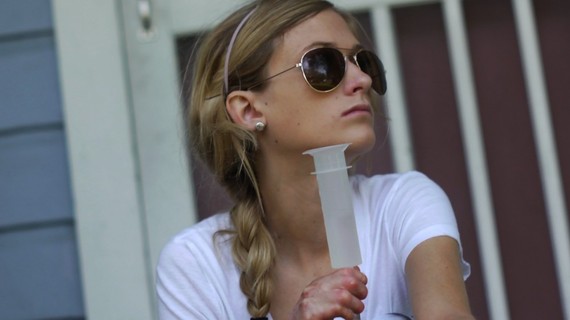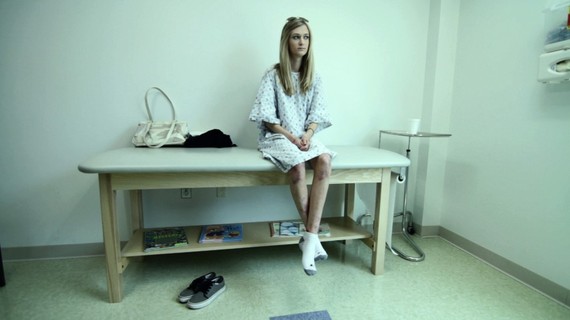Butterfly Girl, a documentary that premiered at this year's South By Southwest, tells the refreshing story of a spunky young Texan with a debilitating disease. Abigail Evans -- Abbie -- is a spitfire who says what she means, and deals with her health misfortunes the best way a teenager can -- with equal parts sarcasm and optimism, and with a constant twinkle in her eye.
For her feature debut, director Cary Bell did not choose easily -- teenage girls are always posing, whether they know it or not. (Have you ever tried to follow a teenager around with a camera, even for an afternoon, hoping for a natural response?) Add to the mix a disease that ravages the skin without mercy, and you've upped the challenge quotient considerably.
We caught up with Bell to discuss her advice to aspiring filmmakers, her philosophies on narrative non-fiction filmmaking, and what makes Abbie so special.
How do you describe Butterfly Girl?
Cary Bell: Butterfly Girl is the story of Abbie Evans, a teenager in Austin, Texas, who sells merchandise for her dad's honkytonk band, despite the fact that she has a really rare skin disease called epidermolysis bullosa (EB). The film follows Abbie's journey towards independence -- as she figures out how she can enter into the world while still remaining healthy and taking care of herself.
How does the disease affect her?
Cary Bell: People who have EB are missing the gene that bonds skin to your body, so she has extra delicate dermis. So if she were to bump herself, or if you were to rub your hand too roughly over her body, her skin will slough and a blister will form. And the same thing happens on the inside, so every time she eats, her esophagus reacts the same way -- it blisters. So it requires an incredible amount of health maintenance.
And she was born this way, right?
Cary Bell: Yes, it's a genetic disease, and it's really, really rare. There's an organization called debra, and their tagline is, "The worst disease you've never heard of." That's pretty true. And Abbie has one of the worst types. It's that rare combination of genes between her two parents.
How did you find out about Abbie? What inspired you to tell her story?
Cary Bell: Her father, John Evans, is my sister's partner -- they make music together, and they are also partners in life. So I'd known Abbie for a while, but not very well -- until, of course, I started shooting this film. It's a big decision when you decide to make a documentary, and my co-producer on the film, Jessica Miller, who is also the editor, and I had both met Abbie, and we decided that if she was into it, we were into it. We all said, "Okay, let's do it." And that's how it happened.
Were you certain from the start that what you were working on would turn into a feature? How long did you plan to film her? Did your plans change?
Cary Bell: First of all, we had no idea what we were doing. [laughs] Jess and I both work in television, so we know it's hard work -- we knew we were going to be doing something difficult. But we kind of figured, "Oh, it will be a little short -- we'll take it to festivals, we'll get a free bag, we'll have fun and meet people." But once we started filming, I pretty quickly realized this was a feature. I remember telling her, and she was like, "Oh, shit."
Wait, telling Abbie or Jess?
Cary Bell: Oh, Jess. With Abbie, she didn't know the difference between a short and a feature. She just thought it was cool that we were her camera crew, following her around...
We didn't really know at the beginning what it would be, and then principal photography lasted about 4 months. It was really intense, because she was a teenager, and everything in a teenager's life changes on a daily basis. Once we got through those four months, we thought, "Okay, we have a story." And so we stopped filming for a little while.
We'd screen the footage, and people would tell us it should be a short. And we were like, "No. It's a feature." So we edited, and then we kept filming, until we had the film we knew we could have.
For the film to work, Abbie had to be totally open and honest and share both her vulnerability and her strength with you. How did you -- and your cinematographer Matthew Godwin --develop a relationship and that level of comfort with Abbie?
Cary Bell: You know, I worked really, really hard at that. And it was definitely a learning experience for me, and for Abbie. Before we even started filming, she knew she was going to have to be comfortable showing her G-tube, for example, and it took me forever for her to let me film her popping her blisters.
It was important to me that she felt like she had a sense of control. I wasn't ever going to make her let me film something she didn't want me to film. But if I felt it was important for the story, I would show her the respect of saying to her why I thought it was important. And she started to learn why. That scene where she's changing her G-tube? That happened at 3 in the morning, and she called me and said, "I'm about to do this. I'll wait until you get here."
So it became this thing where she and Matt and I were all able to work together. And she has an assistant producer credit in the film, because that's what she was. She really helped us.
And she loved and adored Matt so much. When I was looking to hire a DP -- I'd never worked with him before -- I was trying to find a woman, because I knew we this young girl might feel really nervous around a guy, with the intimate things we would show in the film. When I met Matt, I was like, "Oh, wow, he's close to her age." Because he's only 20! So young... which had its challenges as well, because I sometimes felt like the mother. But it worked. And he was a great asset, because she loved being around him.
What about your dynamic as filmmakers with Abbie's parents? I know you know her father John, but her mother Stacie is a little more protective... Were there ever any moments that they didn't want to share with the camera? And who got the final say, them or Abbie?
Cary Bell: Of course there were moments like that -- with all three of them! --where they were like, "We're not okay with this." Because how do you know if you can trust somebody or not? How do you know that someone who is following your family around isn't going to tell the dirty part of the story? You know, you can manipulate anything when you have the footage -- especially if you have a good editor. So I never held it against them when they questioned anything; I just took it. I did my best to explain and solve the problem, or I would just stay away for a while...
They are human beings with opinions, and feelings, so yeah, it was emotional at times. And again, I have really strong opinions when you're doing something like this. My film is not more important than her life -- when she says no, I'm not going to push it, no matter what kind of contracts you have signed.
But we got through it. I would tell them, "We started this. We can't just stop because Abbie changed her mind for a week." And that's what would happen. She would call me after a week and say, "Where are you? Come back." That's just what happens when you're working with real people, who have real lives. And also working with a kid -- the whole film is about her not knowing what she wants!
I know now for a fact that everyone is so happy that we did it. I knew they would be. [smiles]
As a first-time filmmaker, how much did you learn? What would you do differently next time?
Cary Bell: First of all, I would never make anything that has to do with my family again. I know a lot of filmmakers do it, but it's something I will never do again.
Cary Bell: At the beginning, I wanted to create a narrative, non-fiction film. The goal was to make a documentary that felt like a narrative, and I think I achieved that. Now I want to make another movie. I hope to be in production in the fall, and it will be the same -- a documentary that feels like a narrative -- but it will be better, because I've learned what works and what doesn't.
What's one piece of advice you would give to an aspiring filmmaker?
Cary Bell: To be tenacious. Period. I think that talent is important, but I think that tenacity is almost more important. I can't tell you how many people along the way told me, "This should be a short," or "This is bad," or "I hate what you're doing," or "You're ruining my life." [laughs] Or how many times we ran out of money, or had people doubt us. I can't tell you how many people didn't believe in this project until they knew we got into South By Southwest. Oh -- and we applied to so many grants, and we got NO grant money -- but we just kept going. I'd keep saying, "I know there's a good movie here; we just need to find it."
So what's next for you?
Cary Bell: Well, I normally do TV development, so I have a million TV projects for the next couple of months. But then I am working on a project about women from Houston who are lady hustlers from the neighborhoods that are notorious for bringing up male rappers -- the 5th Ward, the 3rd Ward, South Park. I am fascinated by the women there -- by how they live, what they do to survive. I haven't started pre-production yet, but that's my next project.
I'm interested in people who live life with a daily struggle, but who don't let that stop them from moving forward. Like Abbie.
Butterfly Girl screens April 21-22 at the Nashville Film Festival.
Learn more about the film here.
Like Butterfly Girl on Facebook.
Follow @ButterflyGrlDoc on Twitter.
Learn more about EB and debra.


